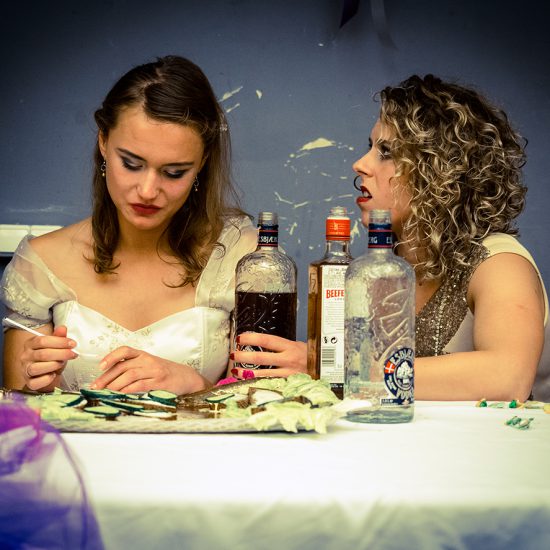„Romeo and Juliet“ demands much, but also delivers
The ninth annual International Festival of Arts and Ideas roared off to a wild and wooly star Friday with Oskaras Korsunovas Teatras” production of “Romeo and Juliet”.
The play runs through Tuesday at Yale’s University Theatre. Lithuanian director Oskaras Korsunovas sets Shakespeare’s romantic tragedy in two rival, contemporary pizza parlors.
In the heat of passion, tempers, hormones and flour fly with reckless abandon. Yet the fervent performances glide through the play’s emotional roller-coaster ride with complete control, rarely missing a dramatic moment.
Korsunovas’ concept for the production (in Lithuanian with English subtitles) aptly explores the play’s genuine humor and dark tragedy. In a prologue created by Korsunovas and the actors, the Capulets and the Montagues attempt to one-up each other in a tit-for-tat, escalating fashion reminiscent of the battles Laurel and Hardy waged on their foil James Finlayson.
The rival families taunt each other with suggestive gestures, gyrations and preposterously stretched out phalluses made from pizza dough. If the table isn’t exactly set for a great meal, it is for an ambitious evening of theatre.
Set designer’s Jurate Paulekaite’s busy pizzeria includes several nifty entrances, utensils and macabre touches, including various, beastly masks that the actors use at propitious times and skeletons, suggesting the ancient, unidentifiable nature of the long-standing family grudge.
Korsunovas’ actors aren’t afraid to exaggerate the characters’ hot and cold emotions to their limits, especially during the comedic moments. Before discovering Juliet at her parents’ party, Romeo (Gytis Ivanauskas, alternating with Giedrius Savickas) mopes through the early scenes so hyperbolically as to make the late Tony Randall’s Felix Unger look stalwart. Somehow, Ivanauskas keeps the moment real an really funny, never crimping on Shakespeare’s needling of a follow love.
Korsunovas stages the play’s more horrific moments with a decidedly poetic, indirect touch. During the fatal fight scene between Mercutio (Dainius Kazlauskas) and Tybalt (Darius Gumauskas), the actors askew a realistic knife fight in favor of a synchronized dance with death. When Mercutio re-appears from behind a kitchen counter with a talc-like death mask made from flour, the audience instantly realizes that he has suffered Tybalt’s fatal blow. This metaphoric use of flour, as well as the use of a large cauldron at the play’s most revealing moments, are among the production’s many imaginative flourishes that refresh the theatergoer’s perspective on a classic work and devoutly serve the playwright’s intentions.
Running just over three hours, this production demands mush form its audience. Yet if one can maintain focus on the subtitles, the exotic language and the visual cornucopia on stage – to say nothing of keeping an open mind for the director’s daring staging – then this “Romeo an Juliet” will be among the most memorable one can see.



